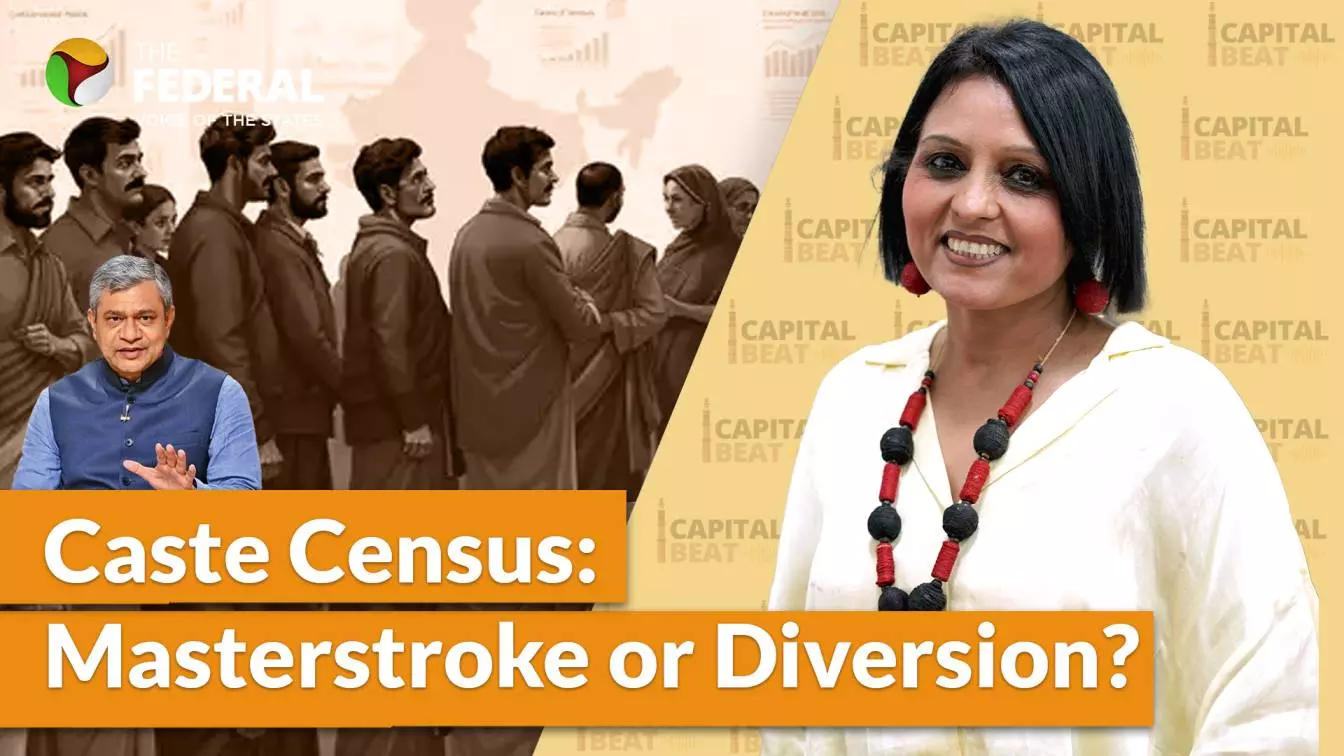
What triggered Modi govt's surprise decision on caste census?
In latest episode of Capital Beat, panellists debate if it’s a Bihar election strategy, a distraction from Pahalgam, or a political shift

In this episode of Capital Beat, The Federal held a sharp discussion on the Narendra Modi government’s surprise announcement of a caste census, bringing together Dalit rights activist Priyadarshi Telang, senior journalist Ashok Mishra, and The Federal’s Political Editor Puneet Nicholas Yadav.
With the Bihar elections looming and national tensions still simmering after the Pahalgam terror attack, the panel dissected whether the BJP’s move is a masterstroke to outflank the Opposition or a desperate diversion — and whether it will backfire within the party’s own core vote base.
A surprise move with unclear intent
Union Minister Ashwini Vaishnaw’s Cabinet announcement that the caste census will be conducted alongside the population census stunned political circles, not least because no timeline or budgetary details were offered.
Also read: Robbed of Caste Census pitch, Congress, allies must now reinvent campaign
Telang called out the government’s timing bluntly: “While the country was expecting decisive action on the Pahalgam attack, what we got was an announcement about caste enumeration. It looks like a deliberate diversion.” He argued that the government has deflected public attention from national security failures by stoking a social justice debate that originated in Bihar.
Mishra highlighted the political origins: “Caste census is not a new issue — it started in Bihar. Leaders like Nitish Kumar and Tejashwi Yadav pushed for it, implementing 65 per cent reservation before the courts intervened. For the BJP, it’s alien terrain.”
RSS pressure and BJP’s balancing act
Yadav offered crucial political context, noting that the move may have been months in the making. “The RSS has been nudging the government towards a caste census since at least last year. So while the announcement looks sudden, the internal discussions have been brewing,” Yadav explained.
Also read: Centre's nod to caste census: Significance and implications
He pointed out a deeper tension: “How does the BJP, historically dismissive of the caste census as divisive, now market it as a unifying tool? Selling this idea to its Brahmin, Baniya, and upper-caste base — its core vote bank — is going to be a tightrope act.”
Opposition: Pressure or opportunity?
The panel dissected whether the Opposition, particularly the Congress, could now claim victory in shaping the national narrative. Yadav underlined Rahul Gandhi’s sharpened stance: “Rahul has set four clear demands — a timeline, breaking the 50 per cent reservation cap, implementing Article 15(5) for private education quotas, and reviving the SC/ST sub-plan. The Congress doesn’t just want to own the narrative; it wants to force structural reforms.”
Also read: Caste census: Rahul welcomes govt's 'sudden' decision, seeks timeline
Telang agreed but issued a caution: “Bihar already has caste data. Migration, poverty, and unemployment are the bigger issues. People may not be swayed by a national census debate when they live with daily economic struggles.”
Bihar: Ground zero for caste politics
Mishra broke down why Bihar remains the crucible for this debate: “The BJP has relied on upper-caste votes but tries to split backward-caste blocs through alliances. Meanwhile, figures like Nitish Kumar and Lalu Prasad Yadav remain the authentic faces of social justice. Bihar voters are savvy — they know who’s been with them all along.”
He dismissed the idea that the BJP can easily reap gains from the announcement: “Bihar’s caste calculus is already hardened. I don’t see the BJP converting this into a wave.”
Governance gaps and credibility questions
Telang raised concerns over the government’s preparedness, pointing to absent administrative groundwork: “There’s no notification from the Registrar General. No teacher training, no budget — just a headline. Without delivery, it’s statistical fog to confuse voters.”
Yadav emphasised the timeline problem: “Even under ideal conditions, this exercise takes a year. Realistically, caste data won’t emerge before mid-2027. Meanwhile, the BJP has to explain how it reversed years of ideological opposition to caste-based enumeration.”
BJP’s double-edged gamble
Mishra offered a striking closing reflection: “The BJP is trying to ‘mandalise’ itself, balancing both Mandal (caste empowerment) and Kamandal (Hindutva) strategies. But internally, the RSS faces growing pressure from backward-caste leaders. This isn’t just a policy gamble; it’s an identity gamble inside the party.”
The government has thrown the caste census bomb into India’s political arena — but with no budget, no timeline, and a skeptical opposition and public watching. Can the BJP sell this as its own idea? Can the Opposition translate it into grassroots momentum? The political contest has just begun.
(The content above has been generated using a fine-tuned AI model. To ensure accuracy, quality, and editorial integrity, we employ a Human-In-The-Loop (HITL) process. While AI assists in creating the initial draft, our experienced editorial team carefully reviews, edits, and refines the content before publication. At The Federal, we combine the efficiency of AI with the expertise of human editors to deliver reliable and insightful journalism.)

